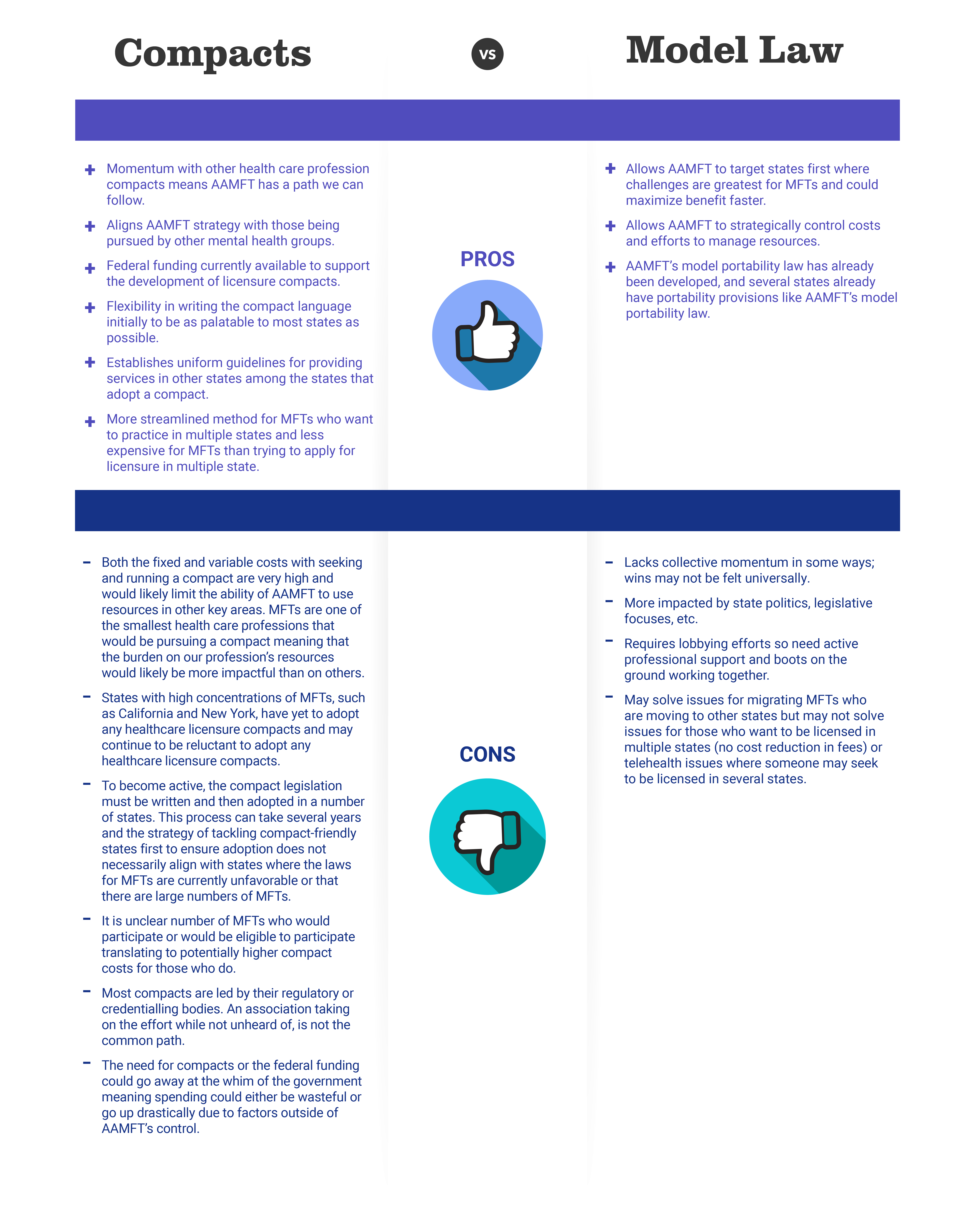State licensure has provided many significant advantages for MFTs and their clients, and the long and ultimately successful battle to obtain licensure in all 50 states ranks as the most significant accomplishment in the growth of the profession in the United States. However, MFT state licensure does have one design flaw—a person’s state-based licensure is only good if you are treating clients residing in your state of licensure.
To provide services regulated under state MFT licensure laws in another state where an MFT is not licensed, in most instances, the MFT must first obtain a license in that other state. Unfortunately, it can be difficult for an MFT to obtain a license in another state when the MFT wants to move permanently or temporarily, set up a satellite office, or provide services virtually to individuals residing in that other state. Barriers include excessive licensure fees, burdensome paperwork requirements, and significant delays in processing applications for licensure. Most troubling are outdated requirements for experienced candidates with an out-of-state MFT license, challenges that sometimes require applicants to track down previous supervisors to verify experience earned years ago, produce old course syllabi to prove they meet education requirements or even retake a course.
License portability is the ability to take an individual’s qualifications for a license in one state and apply them for licensure in another state. For many years, the MFT profession and the other mental health professions have focused on efforts to pass model laws in each state that would allow an out-of-state application to become licensed in other states without having to meet many of the requirements appliable to someone applying for licensure for the first time. Under the standards for licensure in many states, an MFT state licensing agency or board will grant an MFT license to an applicant licensed in another state only if the applicant’s qualifications are substantially equivalent to the qualifications for licensure that the agency or board enforces in that state. However, the more subjective nature of this standard produced many of the outdated requirements that have hindered or prevented many experienced MFTs from obtaining licensure in another state. These barriers have resulted in a loss of income and opportunity for MFTs to earn a living in another state. Another result is fewer therapists who can provide needed services to the public, resulting in more individuals, especially in underserved communities, not receiving care. These barriers do nothing to protect the public from harm.
Portability barriers exist in all licensed healthcare professions. In recent years, there are two major ways that healthcare professions have addressed portability challenges: through the implementation of a new model portability law throughout the states or the creation of an interstate licensure compact.
Another option, formal reciprocity agreements between two or more states, is common among states involving certain issues, but is not common with healthcare licensing. States have been reluctant to enter such agreements, and they do not promote one uniform standard across the country.
Model laws
One method of addressing portability barriers is to have all states adopt uniform language allowing out-of-state licensees to become licensed in a state if they meet certain uniform and reasonable requirements. In many cases, the professional associations were instrumental in creating the uniform model portability language. In the 1990s, AAMFT created a model MFT licensure law that was introduced in the legislatures of states where MFTs were not yet licensed. Although this provision worked well during the efforts to obtain licensure, AAMFT realized that a new model was needed.
In 2019, AAMFT released its new license portability model law. Based upon feedback from a 2018 AAMFT member survey and research, this model law states the following:
The licensure board shall issue a full and unrestricted license to an applicant to practice as a marriage and family therapist if the applicant:
- Has a valid and unrestricted license to practice as a licensed marriage and family therapist in another state or territory; and
- Has completed an application for licensure and paid any required fees.
DEFINITIONS
Common Terms Used to Become Licensed / Practice in Other States
This model is a full endorsement model, meaning that a state will license an applicant for an MFT licensure if the applicant has a valid and unrestricted MFT license in another state. The model language does require that applicants do not have a restricted licensure due to an ethics violation, and the model allows states to require applicants to pass a background check and any state jurisprudence exam. This full endorsement model was also the most popular option among AAMFT members who participated in the 2018 portability survey.
The pandemic sharpened the focus on portability laws, more specifically telehealth laws. States made emergency allowances for telehealth services, including some states allowing for portability of services across state lines. Some of these laws began changing prior to the pandemic and then became more fine-tuned during COVID-19. For example, Florida enacted a law in 2019 that allowed LMFTs licensed outside of Florida to provide telehealth services to clients residing in Florida if the provider registers with the Florida Department of Health, has a registered agent in Florida and meets other requirements. As of May 4, 2022, there were 609 out-of-state LMFTs registered in Florida under this new law. Other states are considering such laws.
All states have entered compacts in some form, and legislatures and governors are routinely asked to approve compacts.
Interstate licensure compacts
An interstate compact is a formal agreement between two or more states that bind them to the provisions of the compact. Compacts are created to harmonize regulations among participating states thereby providing participants (e.g., healthcare providers) an opportunity to join the compact and provide services within the states participating. Healthcare licensure compacts are set up to allow a person licensed to practice in a profession in one state to be able to practice in any other state that has adopted the compact.
All states have entered compacts in some form, and legislatures and governors are routinely asked to approve compacts. However, not all states have demonstrated acceptance for compacts in healthcare. For example, California and New York (two of the more MFT populated states) have not yet participated in ANY healthcare compacts.
>Federal Trade Commission: Options to Enhance Occupational License Portability
To participate in a compact, a provider would first need to register with the compact governing body or commission. The provider would then need to choose in which compact state(s) they would like to apply for a privilege to practice. The fee structure varies among the compacts, but normally involves a standard fee to the commission plus an additional fee from the other compact state the provider wants to practice in, whether in-person or remotely. For example, the fees for physical therapists under the Physical Therapy Compact are a $45 commission fee per state plus a state fee set by each state licensure board/agency that averages to about $50 per state. Generally, the annual fees to join a compact are determined by the number of those joining. A smaller profession could expect to pay higher fees that a larger profession that has large numbers to help cover costs. Healthcare compacts have also set up a licensure database system, which allows applicants to apply online and obtain a privilege to practice in other compact states fairly quickly.
Compacts typically take many years to come to maturation. For example, the nursing compact, originally started in 1999, has been the most successful healthcare compact to date, with only 34 states having accepted the current version. Compacts are very expensive to establish, often in excess of a million dollars. There are also expenses in maintaining a compact. Therefore, AAMFT has traditionally viewed compacts as too expensive for the MFT profession to undertake (i.e. expensive fee for potential members to join the compact to sustain the compact).
Additional Resources

Other articles
Transmitting Hypervigilance Through Intergenerational Trauma: Recommendations for Marriage and Family Therapists
African Americans have been shown to display distrust and hypervigilant behavior against people of authority and knowledge. When relaying their experiences to their peers and family members, hypervigilance seems to spread throughout the community resulting in more distrust.
Tiffany D. J. Sanders and Eman Tadros, PhD
Understanding the Effects of Social Media on the Relationship Between Parents and Adolescents
Social media, accessed through electronic devices, has been positively correlated with depression and anxiety. According to the American Psychological Association (APA), about one-fifth of Americans see digital influences of social media as a source of stress, as they have become a vital component of daily functioning (APA, 2017).
Christopher A. Chandroo, MS and Tziporah Rosenberg, PhD
The Cost of Chronic Infidelity on Spouses and Partners: Understanding Betrayal Trauma
Most betrayed partners are too ashamed to tell anyone about their horrifying discovery—even a therapist. They feel stupid for not knowing that their beloved was cheating and lying right under their nose for years. They blame themselves for their betrayer’s cheating. Infidelity confirms what many women believe—their worth is based on their weight, physical beauty, and desirability.
Michele F. Saffier, MA
